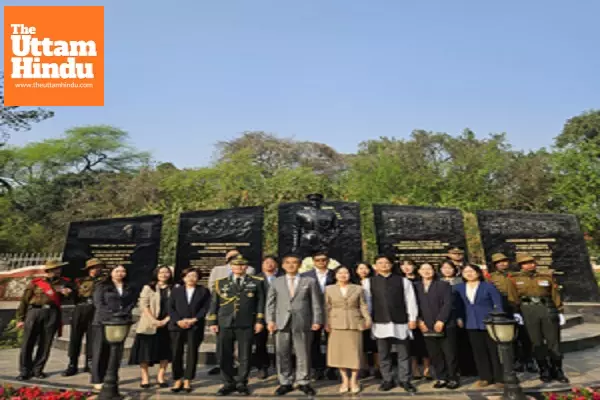
South Korean envoy pays tribute to General Thimayya at Indo-Korean Friendship Park

New Delhi(The Uttam Hindu): Lee Seong-ho, the Ambassador of South Korea in India, and other top diplomats on Friday visited the Indo-Korean Friendship Park in Delhi Cantonment, fondly recalling the contribution of Indian forces during the Korean War of 1950-53.
During their visit to the park, a symbol of strong ties between India and South Korea, the officials also paid tribute to late General K S Thimayya, a celebrated soldier who led the Indian contingent as Chairman of Neutral Nations Repatriation Commission (NNRC) in Korea headed by India. "Ambassador Lee Seong-ho and his team visited the Indo-Korean Friendship Park on the 21st of February and paid homage to General Thimayya, who headed a UN unit dealing with the repatriation of prisoners after the Korean War," the South Korean Embassy in India posted on X.
"We also recalled that India sent the largest number of medical personnel during the Korean War. Remembering the enduring friendship between Korea and India, the Korean Embassy will do our best to further develop our Special Strategic Partnership." the post further added. India's First Indo-Korean Friendship Park was jointly inaugurated by Defence Minister Rajnath Singh and his Korean counterpart Suh Wook in March 2021.
The park, spotlighting India’s contributions as part of 21 countries which participated in Korean war 1950-53 under the aegis of the United Nations, was developed in joint consultation with India's Ministry of Defence, Government of India, Indian Army, Delhi Cantonment Board, Embassy of Korea and Korean War Veterans Association of India. Spread across a green area of six acres, the park has an imposing handshake artifact standing tall at the entrance bearing flags of India and South Korea besides a larger than life statue of General Thimayya.
South Koreans still remember General Thimayya, who was awarded a Padma Bhushan for his service in Korea, with gratitude and affection. General Thimayya also served as the Chairman of the Neutral Nations Repatriation Commission (NNRC) after the armistice and contributed to resolving the humanitarian issues arising out of the War. India played an important role in the Korean peninsula after Korea's independence in 1945, sending an army medical unit - the 60th Parachute Field Ambulance comprising 627 medical personnel, commanded by Lt. Col. A.G. Rangaraj - during the Korean War as part of the UN Command. The unit treated about 220,000 patients. During the Korean War (1950-53), both warring sides accepted a UN resolution sponsored by India and the ceasefire was declared on July 27, 1953.
India-South Korea diplomatic relations were elevated to a 'Special Strategic Partnership' in 2015 during the State Visit of Prime Minister Narendra Modi to Seoul.

